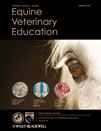
EQUINE VETERINARY EDUCATION
Scope & Guideline
Nurturing knowledge for the future of equine care.
Introduction
Aims and Scopes
- Equine Medicine and Surgery:
Explores various medical and surgical conditions affecting horses, including diagnostics, treatment options, and surgical techniques. - Equine Pathology and Disease Management:
Covers studies related to infectious and non-infectious diseases in horses, including epidemiology, pathology, and management strategies. - Diagnostic Imaging and Procedures:
Investigates advancements in imaging technologies and techniques used for diagnosing equine conditions, enhancing the accuracy of assessments. - Reproductive Health and Disorders:
Focuses on reproductive health issues in horses, including diagnostics, treatment of reproductive disorders, and advancements in reproductive technologies. - Equine Welfare and Behavior:
Examines the welfare implications of equine management practices and behavior, aiming to improve the quality of life for horses. - Nutrition and Metabolic Disorders:
Studies the nutritional aspects and metabolic disorders in horses, providing insights into dietary management and health outcomes. - Veterinary Education and Practice:
Addresses the education and training of veterinary professionals, including the development of curricula and continuing education opportunities.
Trending and Emerging
- Innovative Diagnostic Techniques:
There is an increasing focus on advanced imaging modalities and diagnostic procedures, such as computed tomography and magnetic resonance imaging, which are enhancing the ability to diagnose complex equine conditions. - Equine Sports Medicine:
The rise in equine sports and competitive performance has led to a growing body of research on sports medicine, injury prevention, and rehabilitation techniques tailored to athletic horses. - Antimicrobial Stewardship and Resistance:
Research on antimicrobial resistance and responsible usage has gained momentum, reflecting global trends towards better management of antimicrobial therapies in veterinary practices. - Equine Welfare and Ethical Considerations:
Emerging studies on equine welfare, including behavioral assessments and humane treatment practices, indicate a growing concern for the ethical implications of equine management and care. - Cutting-edge Therapeutics:
The exploration of novel therapeutic agents, including biologics and regenerative medicine, is on the rise, showcasing advancements in treatment options for equine patients.
Declining or Waning
- Traditional Surgical Techniques:
There appears to be a waning interest in conventional surgical techniques as newer, less invasive methods gain prominence. This shift towards minimally invasive approaches may lead to fewer publications on traditional methods. - General Equine Husbandry Practices:
Research focused on general husbandry practices has declined as the field moves towards more specialized areas such as nutrition, behavior, and welfare, indicating a shift in priorities among researchers. - Older Pharmacological Treatments:
As new therapies and treatment modalities emerge, older pharmacological treatments are becoming less frequently discussed, suggesting a transition towards more innovative and effective solutions.
Similar Journals
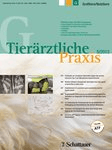
TIERAERZTLICHE PRAXIS AUSGABE GROSSTIERE NUTZTIERE
Enhancing understanding of veterinary practices for food animals.TIERAERZTLICHE PRAXIS AUSGABE GROSSTIERE NUTZTIERE is a pivotal journal in the field of veterinary science, focusing specifically on large animals and food production animals. Published by GEORG THIEME VERLAG KG, this journal has been a resource for veterinary professionals since its inception in 1996, delivering current research and practical insights to its readership through 2024. Despite its classification in the Q4 quartile for both Food Animals and Veterinary (miscellaneous) categories, the journal provides an essential platform for emerging studies, contributing to the interdisciplinary dialogue around veterinary practices. Researchers and practitioners benefit from the journal’s commitment to advancing knowledge, despite its modest rankings in Scopus where it stands at rank #150 in General Veterinary and #32 in Food Animals. While not currently offering Open Access options, the journals’ significant body of work remains an invaluable asset for those dedicated to enhancing animal health and welfare. TIERAERZTLICHE PRAXIS serves as a cornerstone for academic exploration and practical application in the veterinary field, fostering a deeper understanding of the complexities involved in animal care and management.
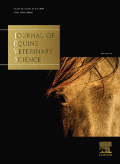
JOURNAL OF EQUINE VETERINARY SCIENCE
Transforming equine health with groundbreaking studies.JOURNAL OF EQUINE VETERINARY SCIENCE, published by Elsevier Science Inc, serves as a premier platform for disseminating innovative research in the field of equine veterinary medicine. With an ISSN of 0737-0806 and an E-ISSN of 1542-7412, this journal has been a beacon of scholarly work since its inception in 1981, projected to maintain its commitment to excellence through 2024. Renowned for its rigorous peer-review process, the journal is currently ranked Q2 in the equine category, showcasing its significance in the veterinary field, particularly within the competitive Scopus ranks where it holds the 3rd position out of 11 evaluated journals, placing it in the 77th percentile. Although not an open-access publication, its contributions are accessible through institutional subscriptions, ensuring that vital research reaches a wide audience of equine veterinarians, researchers, and students. The journal aims to advance the understanding of equine health and welfare, making it an invaluable resource for those dedicated to improving animal care and advancing the science of veterinary medicine.

CATTLE PRACTICE
Transforming veterinary knowledge into practical solutions.Cattle Practice is a specialized journal dedicated to advancing the field of veterinary science, with a particular focus on cattle health and management. Published by the British Cattle Veterinary Association, this journal serves as a vital resource for practitioners, researchers, and students in veterinary medicine and animal science. With a commitment to high-quality research and practical applications, Cattle Practice publishes peer-reviewed articles that cover a wide range of topics, including animal welfare, disease prevention, and innovative treatment methodologies. Although it is no longer indexed in Scopus since 2017, its past coverage and dedicated readership underscore its importance in the field, with a Scopus rank in the lower quartile reflecting a niche yet critical role in contributing to the knowledge base of cattle veterinary practice. Accessible to all stakeholders in the agriculture and veterinary sectors, Cattle Practice remains a cornerstone publication for those interested in the health and sustainability of cattle farming.
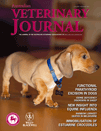
AUSTRALIAN VETERINARY JOURNAL
Advancing veterinary science since 1925.AUSTRALIAN VETERINARY JOURNAL, published by Wiley, is a leading journal dedicated to advancing the field of veterinary science. With a rich history dating back to 1925, this journal has become a vital resource for researchers, professionals, and students interested in veterinary medicine and its diverse applications. As evidenced by its impressive Scopus ranking, placing it in the 67th percentile among General Veterinary publications, and categorized within Q3 of the Medicine (miscellaneous) and Q2 of the Veterinary (miscellaneous) quartiles for 2023, AUSTRALIAN VETERINARY JOURNAL is recognized for its commitment to quality research and impactful contributions. Although not an open access journal, it continues to be an essential platform for disseminating vital findings and innovations within the veterinary community, fostering collaboration and advancement in animal health and welfare.
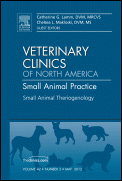
VETERINARY CLINICS OF NORTH AMERICA-SMALL ANIMAL PRACTICE
Leading the way in small animal clinical research.Veterinary Clinics of North America - Small Animal Practice is a prestigious peer-reviewed journal published by W B Saunders Co-Elsevier Inc, dedicated to advancing the field of veterinary science, particularly in small animal practice. Established in 1978, this journal has evolved to be a leading resource for veterinarians, researchers, and students interested in small animal medicine, consistently ranked in the Q1 category for Small Animals as of 2023 and sitting impressively at Rank #4/20 within its Scopus rankings, placing it in the top 82nd percentile of veterinary journals. The journal features high-quality articles that encompass a broad range of topics, including clinical practices, case studies, and innovative research findings aimed at enhancing veterinary care and practice. With its commitment to scholarly excellence and comprehensive coverage, Veterinary Clinics of North America - Small Animal Practice serves as an essential resource for practitioners and academicians seeking to improve their knowledge and practice in veterinary medicine.
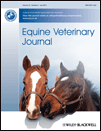
EQUINE VETERINARY JOURNAL
Empowering equine care with cutting-edge insights.EQUINE VETERINARY JOURNAL, published by Wiley, stands as a leading publication in the field of veterinary science, specifically focusing on the welfare and health of equines. Established in 1968, this esteemed journal has garnered a reputation for excellence, reflected in its impressive impact factor and its categorization as a Q1 journal in Equine studies and Q2 in Medicine (miscellaneous) for 2022. As a vital resource for researchers, practitioners, and students alike, the EQUINE VETERINARY JOURNAL presents innovative research, clinical studies, and reviews that push the boundaries of equine veterinary practice. With its rigorous peer-review process and commitment to advancing knowledge, this journal is an indispensable tool for anyone involved in equine health and welfare. It is available in both print and online formats, ensuring accessibility for a global readership.

Slovenian Veterinary Research
Pioneering Research for a Healthier Animal WorldSlovenian Veterinary Research, published by the University of Ljubljana, serves as a significant platform for the dissemination of research within the veterinary field. With an ISSN of 1580-4003 and an E-ISSN of 2385-8761, this open-access journal has made its content freely available to the global research community since 2021, enhancing accessibility and engagement. The journal's scope includes a diverse range of topics relevant to veterinary science, aiming to foster innovation and collaboration among researchers, professionals, and students in the field. Although currently categorized in the Q4 quartile for veterinary studies, the journal is committed to improving its impact and visibility, particularly as it converges on its upcoming years of operation from 2007 to 2024. As it strives to elevate its Scopus ranks, currently positioned at rank #162/194 in General Veterinary, Slovenian Veterinary Research provides a vital resource for advancing knowledge and best practices in veterinary medicine. For anyone interested in the latest veterinary research trends and findings emanating from Slovenia and beyond, this journal represents an essential source of information.
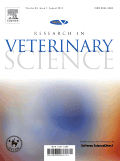
RESEARCH IN VETERINARY SCIENCE
Connecting Researchers for a Brighter Future in Veterinary ScienceRESEARCH IN VETERINARY SCIENCE, published by Elsevier Science Ltd, stands as an authoritative platform in the field of veterinary studies. With its origins dating back to 1965, this prestigious journal is recognized for its contribution to the advancement of veterinary knowledge and practices, boasting a remarkable Q1 categorization in Veterinary (miscellaneous) and ranking 24th out of 194 in the Scopus veterinary general category, placing it in the top 13% of its field. The journal presents a diverse range of research articles that explore critical topics in veterinary science, thereby facilitating evidence-based practices and innovations. Although currently not an open-access journal, it remains highly accessible through institutional and personal subscriptions, allowing researchers, professionals, and students to benefit from its rich collection of studies. As it moves toward 2024, RESEARCH IN VETERINARY SCIENCE continues to be a vital resource for those dedicated to improving animal health and advancing veterinary science.

ACTA VETERINARIA SCANDINAVICA
Transforming veterinary research into global knowledge.ACTA VETERINARIA SCANDINAVICA is a prestigious open-access journal dedicated to advancing the field of veterinary science and promoting interdisciplinary research. Published by BMC since 2001, this journal has become a vital resource for veterinarians, researchers, and students worldwide, with an ISSN of 0044-605X and an E-ISSN of 1751-0147. With a remarkable impact factor reflecting its relevance—ranking in the Q2 quartile for Veterinary (miscellaneous) and Q3 for Medicine (miscellaneous)—ACTA VETERINARIA SCANDINAVICA focuses on a broad spectrum of veterinary topics, ensuring that critical research is available to the academic community and beyond. Located in the United Kingdom, this journal has successfully converged its publishing efforts from 1960 to 2024, highlighting its long-standing commitment to veterinary excellence. Researchers are encouraged to submit their work through the journal’s user-friendly platform, contributing to the ever-evolving landscape of animal health and welfare.

PFERDEHEILKUNDE
Elevating standards in equine veterinary science.PFERDEHEILKUNDE is a prominent journal dedicated to advancing knowledge in the equine veterinary field, published by Hippiatrika Verlag GmbH in Germany. This journal addresses various aspects of equine health, welfare, and medicine, ranking in the 13th percentile among peers in the veterinary equine category. With its convergence period from 1996 to 2024, it serves as a significant resource for researchers, professionals, and students alike, fostering a rich academic dialogue on veterinary practices and innovations. Although it operates on a standard access model, its importance in the realm of equine studies remains undisputed, contributing valuable insights and fostering advancements in equine health management. As the field continues to evolve, PFERDEHEILKUNDE plays a critical role in disseminating essential research findings that support the welfare of horses globally.